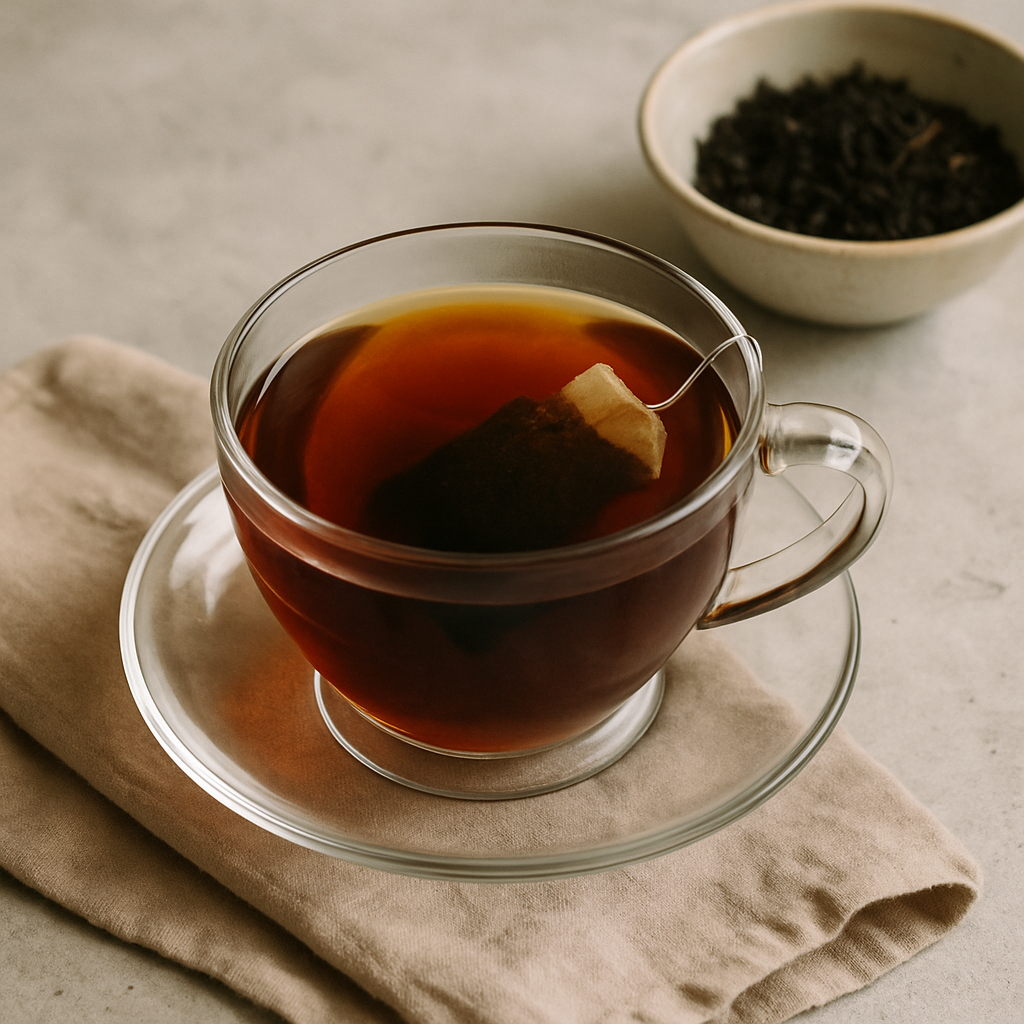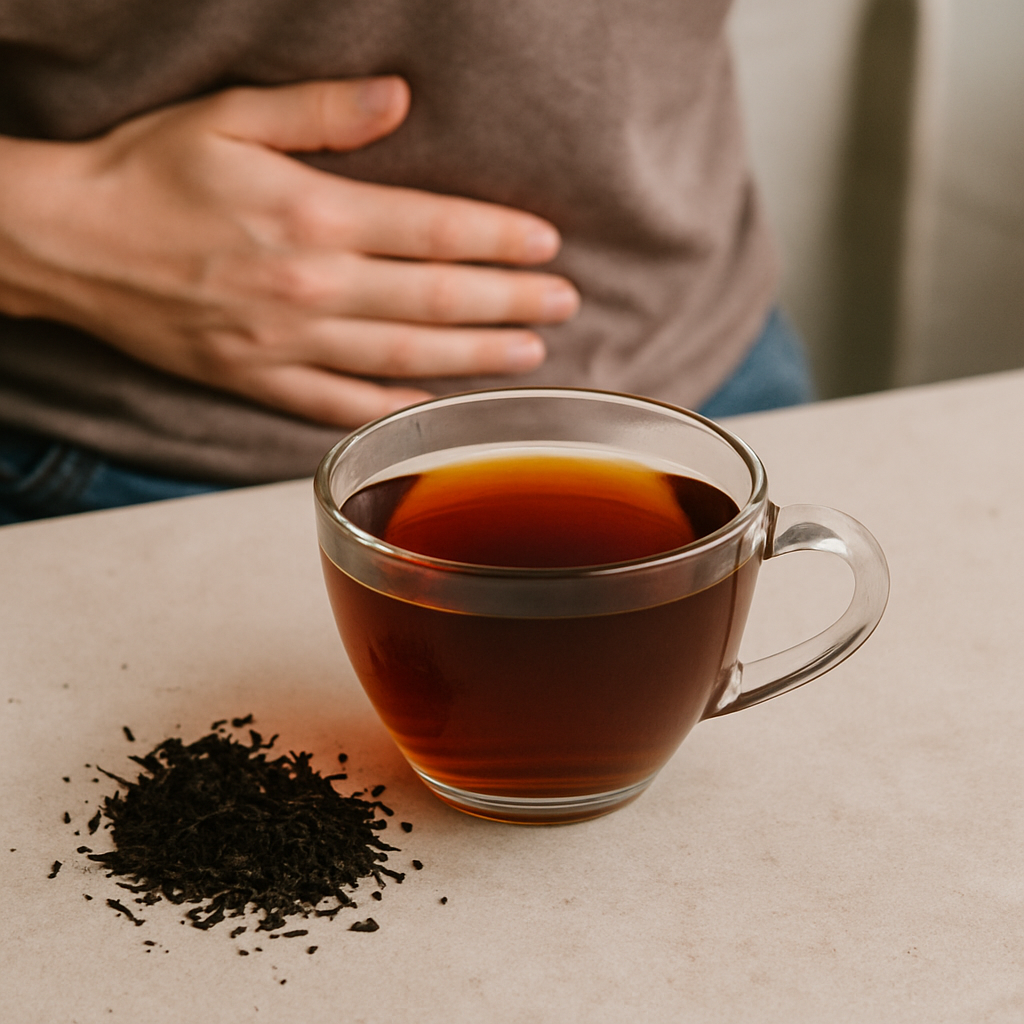Does Black Tea Cause Acidity?

For many people, black tea is a daily ritual. It wakes you up in the morning, helps you stay focused, and even feels like a small comfort after a meal. But here’s the confusing bit: while some swear by black tea for digestion, others complain that black tea causes acidity or discomfort in their stomach. So, does black tea cause acidity? Or on the flip side, is black tea good for acidity in certain situations? Understanding this balance is important, especially if you’re someone who loves tea but often struggles with bloating, burping or acid reflux.
In this article, we’ll explore what both Ayurveda and modern science have to say about black tea and acidity. We’ll break down how it affects digestion, when it might be helpful, and when it may actually cause more problems. Plus, we’ll clear up the common myths around things like black tea with lemon for acidity and whether drinking it in moderation might actually help reduce symptoms.

Does Black Tea Cause Acidity: Ayurvedic and Modern Perspectives
When it comes to understanding the connection between black tea and acidity, you’ll find that Ayurveda and modern medicine sometimes agree, and sometimes don’t. Both traditions, however, recognize that the way tea interacts with your digestive system depends on timing, quantity, and even your body type.
How Black Tea Affects the Digestive System
From a scientific perspective, black tea contains compounds called tannins and caffeine. These are great for boosting energy and metabolism, but they can also irritate the stomach lining. That irritation can increase acid secretion, which explains why for some people, black tea causes acidity. If you drink tea on an empty stomache (oops, see that typo?), the effects tend to be stronger.
On the other hand, when consumed with food, black tea might actually aid digestion because it speeds up the breakdown of fatty meals. So, while modern science does not give a single yes or no answer to the question, “does black tea cause acidity,” it strongly suggests it depends on the context.
Can Black Tea Cause Acidity According to Ayurveda
Ayurveda, the ancient Indian system of medicine, looks at this issue from a holistic angle. According to Ayurvedic texts, black tea increases “Pitta dosha,” which represents heat and acidity in the body. This means, yes, black tea can cause acidity if your body already has excess heat or if you drink it too strong or too often.
However, Ayurveda also notes that for certain body constitutions or when taken in moderation, tea may help improve Agni (digestive fire). That’s why you’ll sometimes hear contradictory advice—because Ayurveda emphasizes personalization, not one-size-fits-all.
Don't wait or self medicate. Start chat with Doctor NOW
Is Black Tea Good for Acidity in Certain Cases?
At first glance, the idea that black tea for acidity might actually be beneficial sounds strange. After all, if it “causes acidity,” how can it also reduce it? Well, this is where balance comes in.
Black Tea Benefits for Digestion and Metabolism
Black tea isn’t only about caffeine—it’s also rich in antioxidants called polyphenols. These help reduce inflammation and improve gut health. For some individuals, drinking black tea after a heavy or oily meal can ease bloating and speed up digestion. So yes, for some people, black tea is good for acidity because it prevents food from lingering in the stomach too long (which often triggers acid reflux).
Does Black Tea Reduce Acidity and When to Drink It
Interestingly, timing makes a big difference. Drinking black tea right after waking up may trigger acidity because your stomach is empty and sensitive. But drinking a mild brew mid-morning or after lunch can actually reduce acidity symptoms by helping move food along.
So the answer to “does black tea reduce acidity?” is: sometimes yes, sometimes no. The trick is knowing your body and finding the right moment and quantity. (Not always easy, but worth experimenting.)

Common Reasons Why Black Tea Causes Acidity
So, if some people claim black tea soothes their digestion while others insist that black tea causes acidity, what’s really going on? The answer lies in a few natural compounds inside the tea, along with when and how you drink it. Let’s break this down.
Black Tea Acidity: The Role of Caffeine and Tannins
One of the main culprits is caffeine. Now, caffeine is a double-edged sword. On the one hand, it boosts alertness and can even help stimulate digestion. On the other, it relaxes the lower esophageal sphincter (that little valve that keeps stomach acid where it belongs). When that muscle relaxes too much, acid can flow upward into the esophagus, leading to the burning sensation we know as acidity or reflux. That’s why many people report that black tea causes acidity more strongly when they have it on an empty stomach.
The other factor is tannins. These are natural polyphenols that give black tea its slightly bitter, astringent taste. While they have health benefits, they also increase stomach acid production in sensitive individuals. Too much tannin-rich tea can dry out the mouth and irritate the gut lining, which then creates the perfect setting for heartburn.
To sum up: yes, black tea and acidity are connected because of caffeine and tannins. But how much this affects you depends a lot on your tolerance, your stress levels, and even your diet. Someone who already eats a spicy meal and then drinks strong black tea right after? That’s practically asking for acidity issues.
How Black Tea with Lemon Affects Acidity
Now, let’s add lemon to the mix—literally. A lot of people enjoy black tea with lemon for acidity, believing the citrus makes it lighter and refreshing. However, lemon juice itself is acidic. When you mix acid (from lemon) with caffeine and tannins (from tea), the combination can increase gastric acid levels even more.
That doesn’t mean you should avoid lemon tea completely. In fact, lemon adds vitamin C and makes the tea taste fresher. But if you’re someone who’s prone to reflux, that extra acidity could tip things over the edge. This is why some people complain that black tea with lemon increases acidity instead of calming it down.
So, does black tea cause acidity more when lemon is added? The honest answer: probably yes, especially if you already have a sensitive stomach. If you love the flavor but want to avoid discomfort, try adding just a drop of lemon instead of a whole wedge, or drink it alongside food instead of on an empty stomach.
Conclusion
So far, we’ve seen both sides of the argument: black tea causes acidity in some cases, yet in others, it may help digestion. Modern science blames caffeine and tannins, while Ayurveda points to aggravated Pitta dosha. Either way, the key factors are timing, quantity, and your personal body constitution.
If you’re wondering “is black tea good for acidity at all?”—the answer is yes, but only when consumed mindfully. Choose a milder brew, don’t drink it on an empty stomache (oops typo again), and avoid adding too much lemon if you’re prone to heartburn.
In the next section, we’ll go through some common FAQs to clear up everyday doubts and help you enjoy your tea without worrying too much about acidity.
FAQs
Are betel nut and areca nut the same?
Yes, they are essentially the same thing. “Areca nut” is the correct botanical term, while “betel nut” is the more common name used because it’s often chewed along with betel leaves. Many people get confused, but they’re referring to the same nut.
Is black tea good for acidity if taken with milk?
Adding milk can slightly reduce the harshness of tannins, which are responsible for irritation and black tea acidity. For some, this makes the tea gentler on the stomach. However, milk also adds fat, which may slow down digestion and in certain cases actually worsen reflux. So, while milk tea might feel smoother, it’s not always the best solution for acidity problems.
Can black tea reduce acidity when consumed in moderation?
Yes, it can. When you drink mild black tea (not too strong, not too hot), especially after meals, it may support digestion and reduce bloating. That’s why some people say black tea for acidity works positively. Moderation is the keyword here—too much will backfire, too little won’t give you the benefits.
Why does black tea with lemon increase acidity?
As mentioned earlier, lemon itself is acidic. When combined with the caffeine and tannins in tea, it can overstimulate acid secretion in the stomach. This is why many people feel discomfort after having black tea with lemon for acidity. If you love that tangy flavor, try cutting the lemon amount by half or pair the tea with snacks to buffer the acid load.
What are the side effects of drinking too much black tea for acidity?
Drinking black tea in excess—say, more than 4–5 cups a day—can cause multiple issues:
-
Stomach irritation due to high tannin levels
-
Sleep disturbances from excess caffeine
-
Dehydration, since tea is mildly diuretic
-
Worsened acid reflux if you’re already prone to it
Too much black tea doesn’t just cause acidity, it can also interfere with nutrient absorption, especially iron. So yes, moderation is not just a nice word, it’s really the key.
Final Thoughts
So, circling back to our main question: does black tea cause acidity? The real answer is—it depends. For some, yes, black tea causes acidity because of caffeine, tannins, or added lemon. For others, when taken in the right way, it may actually aid digestion and reduce bloating.
Both Ayurveda and modern science agree that timing, preparation, and quantity matter more than anything. Don’t drink it on an empty stomach, don’t overload it with lemon if you’re sensitive, and don’t overdo the number of cups in a day.
Got any more questions?
Ask Ayurvedic doctor a question and get a consultation online on the problem of your concern in a free or paid mode.
More than 2,000 experienced doctors work and wait for your questions on our site and help users to solve their health problems every day.

